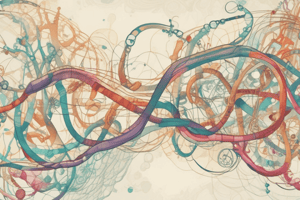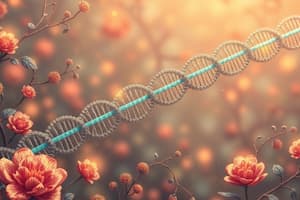Podcast
Questions and Answers
Where does transcription occur in eukaryotic cells?
Where does transcription occur in eukaryotic cells?
- Cytoplasm
- Nucleus (correct)
- Plasma membrane
- Mitochondria
What is the role of RNA polymerase during the elongation phase of transcription?
What is the role of RNA polymerase during the elongation phase of transcription?
- To add ribonucleotides to the growing RNA chain (correct)
- To initiate DNA replication
- To unwind the DNA double helix
- To cleave the RNA transcript
Which subunit of RNA polymerase contains polymerase activity?
Which subunit of RNA polymerase contains polymerase activity?
- Sigma subunit
- Alpha subunit
- Beta subunit (correct)
- Gamma subunit
What is the purpose of adding a 5' cap to the nascent RNA transcript?
What is the purpose of adding a 5' cap to the nascent RNA transcript?
What triggers the termination of transcription?
What triggers the termination of transcription?
What process involves the removal of non-coding regions in eukaryotic genes?
What process involves the removal of non-coding regions in eukaryotic genes?
What is the significance of complementary base pairing during transcription?
What is the significance of complementary base pairing during transcription?
What type of molecule is added to the 3' end of the RNA transcript during polyadenylation?
What type of molecule is added to the 3' end of the RNA transcript during polyadenylation?
Which of the following occurs during the cleavage and polyadenylation phase after transcription?
Which of the following occurs during the cleavage and polyadenylation phase after transcription?
What is the role of the spliceosome during RNA processing?
What is the role of the spliceosome during RNA processing?
What does RNA editing involve?
What does RNA editing involve?
What direction does RNA polymerase synthesize the RNA strand during elongation?
What direction does RNA polymerase synthesize the RNA strand during elongation?
What does the sigma subunit do in the initiation phase of transcription?
What does the sigma subunit do in the initiation phase of transcription?
How is the stability of RNA molecules regulated?
How is the stability of RNA molecules regulated?
Which process allows a single gene to generate multiple RNA isoforms?
Which process allows a single gene to generate multiple RNA isoforms?
What facilitates the transport of mature RNA from the nucleus to the cytoplasm?
What facilitates the transport of mature RNA from the nucleus to the cytoplasm?
What is the role of the sigma factor in prokaryotic RNA polymerase?
What is the role of the sigma factor in prokaryotic RNA polymerase?
What is the first step in the translation process?
What is the first step in the translation process?
Which type of RNA polymerase synthesizes rRNA in eukaryotes?
Which type of RNA polymerase synthesizes rRNA in eukaryotes?
Which codon signals the start of translation?
Which codon signals the start of translation?
What occurs during the elongation phase of translation?
What occurs during the elongation phase of translation?
What does the coding region of a transcription unit contain?
What does the coding region of a transcription unit contain?
What is the role of release factors in the termination phase?
What is the role of release factors in the termination phase?
Where does translation occur in the cell?
Where does translation occur in the cell?
What is the function of tRNA during translation?
What is the function of tRNA during translation?
Which of the following is not a post-translational modification?
Which of the following is not a post-translational modification?
Which subunit is NOT part of the prokaryotic RNA polymerase core enzyme?
Which subunit is NOT part of the prokaryotic RNA polymerase core enzyme?
Which of the following is NOT a component of the translation process?
Which of the following is NOT a component of the translation process?
What signal marks the end of transcription in a transcription unit?
What signal marks the end of transcription in a transcription unit?
Flashcards are hidden until you start studying
Study Notes
Transcription Overview
- Transcription occurs in cytoplasm for prokaryotes and in the nucleus for eukaryotes.
- DNA serves as the template to synthesize mRNA.
Steps of Transcription
- Initiation:
- RNA polymerase holoenzyme binds to the promoter.
- Sigma subunit facilitates DNA unwinding, allowing RNA synthesis to commence.
- Elongation:
- RNA polymerase synthesizes RNA in the 5’ to 3’ direction while moving 3’ to 5’ along the DNA.
- Formation of phosphodiester bonds between ribonucleotides is catalyzed by RNA polymerase.
- The β subunit ensures correct ribo-nucleotide addition and catalyzes RNA synthesis.
- A proofreading mechanism enables correction of any incorporated errors during transcription.
- Termination:
- RNA polymerase encounters a termination signal, leading to the release of the synthesized RNA.
- Cleavage occurs, and a polyadenylation signal (AAUAAA) prompts the addition of a poly(A) tail.
Post-Transcription Modifications in Eukaryotes
- Capping:
- 5’ cap (7-methylguanosine) added to the nascent RNA transcript for protection and translation initiation.
- Splicing:
- Introns (non-coding regions) are removed, while exons (coding sequences) are joined by the spliceosome to form mRNA.
- Polyadenylation:
- Addition of a poly(A) tail to 3’ end increases RNA stability and facilitates export to cytoplasm.
- RNA Editing:
- Nucleotide sequence may be modified post-transcription, involving insertions, deletions, or substitutions.
- RNA Transport:
- Mature RNA transported from nucleus to cytoplasm via export signals and proteins.
- RNA Stability and Degradation:
- Lifespan of RNA is regulated by intrinsic sequences affecting stability.
- Alternative Splicing:
- Different proteins generated from a single gene through splicing variations increases proteomic diversity.
Prokaryotic vs. Eukaryotic RNA Polymerase
- Prokaryotic polymerase is a core enzyme with five subunits (α, β, β’, ω) plus a sigma factor to initiate transcription.
- Eukaryotic RNA polymerase has three types:
- RNA Polymerase I: Synthesizes rRNA.
- RNA Polymerase II: Synthesizes mRNA and some snRNA.
- RNA Polymerase III: Synthesizes tRNA and small RNAs.
DNA Transcription Unit
- Composed of:
- Promoter: Upstream sequence signaling transcription start.
- Coding region: DNA sequence that is transcribed, including exons and introns.
- Terminator: Downstream sequence signaling the end of transcription.
Translation Overview
- Translation decodes mRNA to produce proteins, occurring in the cytoplasm.
Key Components in Translation
- mRNA: Carries genetic instructions from DNA to ribosome.
- Ribosomes: Complexes of rRNA and proteins that synthesize proteins from amino acids.
- tRNA: Adapters that transport specific amino acids to ribosomes, matching anticodons with mRNA codons.
- Amino Acids: Building blocks of proteins, with 20 different types assembled in specific sequences.
Steps of Translation
- Initiation:
- Small ribosomal subunit binds to start codon (AUG) on mRNA.
- Initiator tRNA binds with methionine; large ribosomal subunit joins to form full ribosome.
- Elongation:
- Ribosome reads codons on mRNA, bringing in corresponding tRNAs with the nucleotides.
- Peptide bonds form between amino acids as the polypeptide chain grows.
- Ribosome has three functional sites: A (aminoacyl), P (peptidyl), and E (exit).
- Termination:
- When a stop codon (UAA, UAG, UGA) is reached, no tRNA pairs, triggering release factors.
- Newly synthesized polypeptide chain is discharged; ribosome subunits dissociate for reuse.
Post-Translational Modifications
- New proteins may undergo folding, cleavage, and functional group additions to achieve full functionality.
- Translation is a highly regulated process, ensuring accuracy and efficiency according to mRNA instructions.
Studying That Suits You
Use AI to generate personalized quizzes and flashcards to suit your learning preferences.




